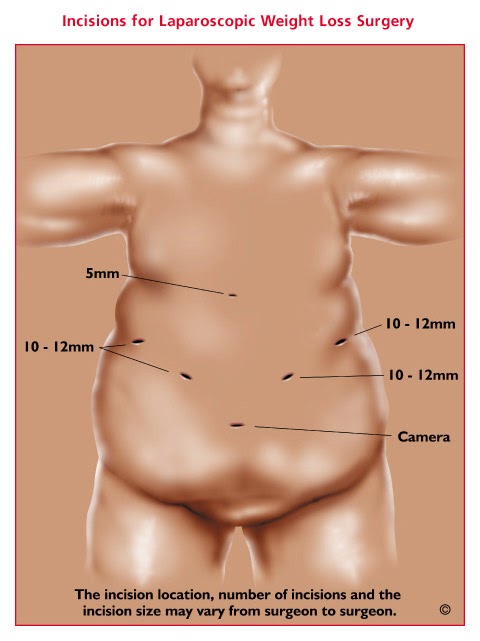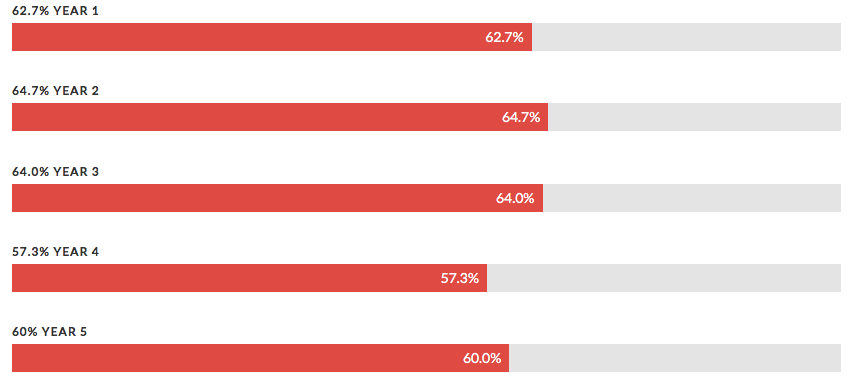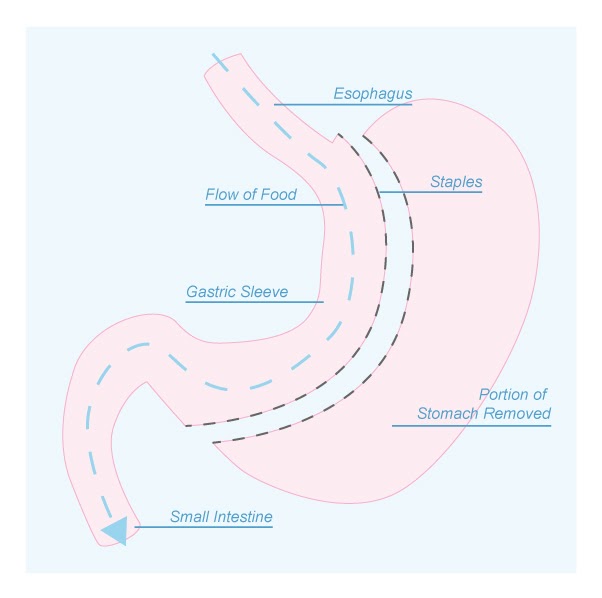Why We Perform More Gastric Sleeve Surgeries Than Any Other Weight Loss Procedure
If nixing your trips to the the donut shop and regularly speed-walking around your Amarillo neighborhood haven’t been enough to shed your excess weight, you may be wondering about your options for bariatric surgery.
Gastric sleeve surgery, also known as laparoscopic sleeve gastrectomy (LSG) and vertical sleeve gastrectomy (VSG), works so well that it’s currently the most popular bariatric procedure for weight loss.
Besides losing an average of 65% of your excess body weight, gastric sleeve surgery also resolves most weight-related medical conditions. Plus, the complication rate is next to nil and the procedure is one of the simplest bariatric surgeries to perform (i.e., it’s one of the safest for patients).

Today, we’re going to talk about why gastric sleeve surgeries account for 70% of the procedures we perform here at Panhandle Weight Loss Center.
We’ll highlight everything you need to know about sleeve surgery, how you’ll lose your excess weight, and if the risks really outweigh the rewards.
So What is Gastric Sleeve Surgery Anyway?
Gastric sleeve surgery is a minimally-invasive stomach restricting procedure.
Unlike gastric bypass or the duodenal switch, gastric sleeve surgery doesn’t change the way your digestion works. It just makes your stomach smaller so you can’t eat too much.
Here’s exactly how the procedure works:
Step 1: State-of-the-art laparoscopic instruments are inserted via 4–6 small incisions across your abdomen. Your surgeons will perform the whole procedure through these viewing ports (instead of opening you up) for minimal scarring.

Step 2: Permanently decreasing your stomach size involves sectioning off a banana-sized sleeve from the rest of your stomach. Your surgeons will remove approximately 70–85% of your stomach and leave the section known as “the greater curve” behind.
Your doctors will seal off this part of your stomach with a stapling device.
Surgery takes about 1.5–2 hours to perform and you’ll stay in the hospital about one or two nights. Don’t worry, you won’t be out of commission forever; you can expect to return to work in one to two weeks.
By removing most of your stomach, you’ll eat fewer calories and feel fuller sooner. This chain of events leads to both short- and long-term weight loss results. Let’s talk about how that works.
Is Gastric Sleeve Surgery Effective for Sustained Weight Loss?
With an 80% success rate, gastric sleeve surgery has been proven to help people lose a majority of their excess body weight within the first 6–12 months after surgery.
There are three reasons for why patients lose so much weight after gastric sleeve surgery:
- A smaller stomach restricts your calorie intake. Reducing your stomach’s volume makes it easy for less food to feel like more food. Portion control comes naturally so you always know when you’ve eaten enough.
You’ll still eat three square meals a day, they’ll just be about the size of your palm instead of Texas-sized.
- Hunger decreases in almost all patients following gastric sleeve surgery because your smaller stomach will produce less ghrelin.
This hormone is responsible for triggering your appetite. Removing a large portion of your stomach means significantly smaller quantities of this hormone floating around. Translation: You won’t feel so hungry all of the time.
If you’ve ever tried calorie-restricting diets before, you probably felt deprived and ravenous all the time. That won’t be the case post-gastric sleeve.
- You’ll achieve sustained weight loss because you’re not altering your digestive path.
Unlike gastric bypass surgery, your pyloric valve functions as normal after a gastric sleeve, which means it will shut during digestion and allow your stomach to fill up and expand as you’re eating.
When you feel these telltale symptoms of having enough to eat, like a full belly, you’ll reach your limit and stop.
Gastric bypass surgery not only bypasses your pyloric valve, it also keeps your stomach from expanding. These two triggers make it hard to know when you’re eating too much.
Check out this chart showing the average excess weight patients lost each year after sleeve surgery:

Of course, these are just averages; how much you lose post-surgery is entirely dependent on your lifestyle and habits afterwards.
Here at PWLC, we believe in 5 basic principles to guarantee sustained weight loss:
- Quality nutrition
- Daily exercise
- Post-surgery follow-up
- Adequate vitamin intake
- Weight loss support groups
Stick to these five pillars and you could drop all of your excess weight; however, if you go back to take out and binge watching on the couch and you may not lose as much.
What Medical Conditions Does Gastric Sleeve Help Resolve?
When you’re overweight or obese, losing weight isn’t just about looking good for your selfies (though it’s a big part!), it’s also about getting your body back to a healthy state.
Gastric sleeve surgery has been shown to reduce and even eliminate certain weight-related medical conditions. Check out these comorbidity resolution rates post-gastric sleeve:
- Diabetes: 55%
- Asthma: 90%
- Hypertension: 68%
- Migraines: 57%
- Infertility: 58%
- Depression: 55%
- GERD: 50%
- Venous Stasis: 95%
- Metabolic Syndrome: 62%
- Joint/Bone Disease: 46%
- Cholesterol issues: 64%
- Sleep Apnea: 62%
- PCOS: 79%
Additionally, since you’ll be losing a significant amount of weight, don’t be surprised if you find relief from pain in your back, legs, knees, hip, and feet following surgery. You’ll be able to walk, run, and exercise without feeling so crummy during your sesh or afterwards.
Patients who’ve had gastric sleeve surgery have an 89% lower chance of death than obese individuals who do not have bariatric surgery. That’s like having a whole new lease on life.
What Are the Risks Involved in Gastric Sleeve Surgery?
All surgeries come with their own unique set of risks.
Complication rates for gastric sleeves are generally low and oftentimes better than gastric bypass surgery. Since there’s no intestinal rerouting, it’s a much easier (and shorter) procedure to perform.
You’re not changing your body’s natural digestion path, so you’re less likely to deal with issues like malabsorption of vitamins and minerals.
A risk specific to gastric sleeve surgery is leaking from where your new stomach has been sectioned off with staples.
These leaks are usually detected during surgery and fixed before your procedure is over. But in the slight chance they happen when you’re home, they typically occur within the first two weeks to first month after surgery.
They could be triggered by something as small as eating something not on your approved post-op diet or something larger such as improper stomach tissue healing.
Dr. Bleu and Dr. Bo perform all of their surgeries together as a team. They have less than a 0.1% complication rate with gastric sleeve surgeries so you’re in the best hands.
Are You a Good Candidate for Gastric Sleeve Surgery?
To qualify for gastric sleeve surgery, you have to be healthy enough to undergo the surgical procedure and you also need to have a:
- BMI ≥ 40
- BMI ≥ 35 with 1 weight related medical condition
Don’t know your body mass index number? Use this free BMI Calculator to find yours right now.
If you learn that you don’t necessarily meet the criteria for gastric sleeve surgery, PWLC also offers nonsurgical weight loss procedures, such as the gastric balloon, and a medically supervised weight loss program as well.
Is Gastric Sleeve Surgery Covered By My Insurance?
Gastric sleeve surgery has been the most popular bariatric surgery procedure for the last five years and insurance companies are finally taking note.
Many major insurance companies now provide coverage for gastric sleeve surgery, but you’ll need to check with your specific healthcare provider to find out if they’re one of them.
Our experts can help you find coverage for your procedure—or match you with a finance plan to help cover your out-of-pocket expenses—so money doesn’t keep you from living the healthy life you deserve.
Why Should You Consider Gastric Sleeve Surgery?
Trying to lose a lot of excess weight on your own is almost impossible—especially when there are more Texas barbecue joints than weight loss support groups in the area!
But imagine actually liking the first outfit you pick to wear to the Amarillo Symphony, or not feeling so hot and sweaty during the brutal summer heat.
Gastric sleeve surgery may be the tool you need to finally get on the straight-and-narrow path to better health.
Your smaller tummy will fill up faster so you’ll know exactly when it’s time to stop grazing for snacks. You’ll also produce less ghrelin so you won’t feel starving all the time like you would on a diet.
So whether you want to start hiking or biking at the Palo Duro Canyon, or just be able to keep up with your kids, gastric sleeve surgery is the best minimally invasive procedure for sustained weight loss you can count on.
